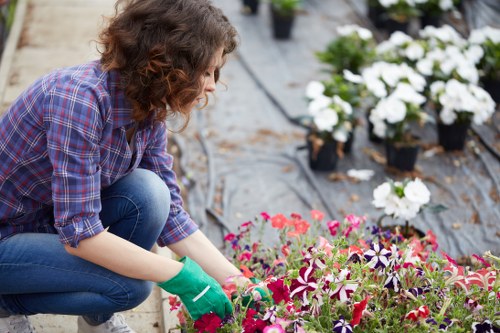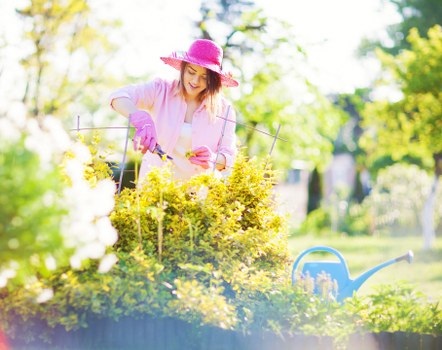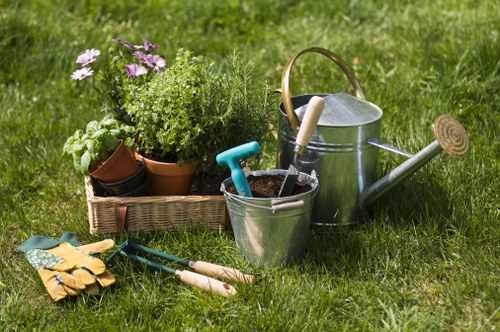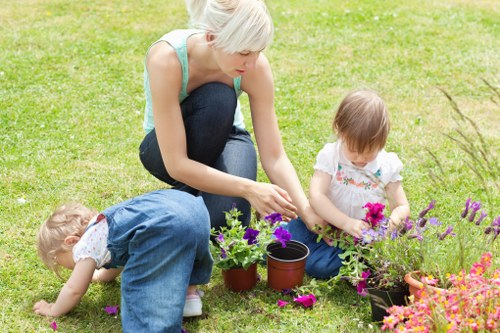Landscape Gardening in Abbey Wood: Transforming Your Outdoor Space

Introduction to Landscape Gardening in Abbey Wood
Welcome to the vibrant world of landscape gardening in Abbey Wood, where your outdoor spaces are transformed into havens of beauty and tranquility. Whether you're looking to redesign your garden, enhance your property's curb appeal, or create a serene backyard retreat, landscape gardening offers the perfect solution.
Abbey Wood, known for its lush greenery and community spirit, provides an ideal backdrop for creative and functional garden designs. With a variety of plants suited to the local climate and a range of gardening services available, achieving your dream garden has never been easier.
In this comprehensive guide, we'll explore the essentials of landscape gardening in Abbey Wood, offering tips, ideas, and insights to help you make the most of your outdoor spaces.

Understanding the Local Climate
Climate Considerations for Abbey Wood Gardens
Abbey Wood enjoys a temperate maritime climate, characterized by mild winters and warm summers. This climate is conducive to a diverse range of plants, allowing gardeners to experiment with various species and garden styles.
When planning your landscape garden, it's crucial to consider factors such as sunlight exposure, soil type, and rainfall patterns. Understanding these elements will help you select the right plants and design a garden that thrives year-round.
Additionally, local microclimates within Abbey Wood can vary, so observing your specific garden's conditions will lead to more successful gardening outcomes.
Soil Preparation and Maintenance
Healthy soil is the foundation of a thriving garden. In Abbey Wood, soil quality can range from sandy to clayey, each requiring different preparation methods.
- Sandy Soils: Improve water retention by adding organic matter such as compost or well-rotted manure.
- Clay Soils: Enhance drainage by incorporating coarse sand or gravel and ensuring adequate aeration.
- Loamy Soils: Generally well-balanced, loamy soils may only need periodic fertilization to maintain fertility.

Designing Your Landscape Garden
Planning and Layout
Effective landscape gardening begins with thoughtful planning. Start by assessing your space, determining focal points, and deciding on the overall aesthetic you wish to achieve.
Consider elements such as pathways, seating areas, water features, and plant beds. Creating a balanced layout ensures that your garden is both functional and visually appealing.
Using design principles like symmetry, focalization, and gradation can help in organizing your garden elements harmoniously.
Choosing Plants and Features
Selecting the right plants is key to a successful landscape garden. In Abbey Wood, you have access to a variety of native and ornamental plants that can add color, texture, and structure to your garden.
- Flowering Plants: Roses, lavender, and marigolds provide vibrant colors and pleasant fragrances.
- Evergreens: Boxwood, holly, and yew offer year-round greenery and structure.
- Ornamental Trees and Shrubs: Japanese maples, hydrangeas, and lilacs add vertical interest and seasonal blooms.

Maintenance and Care
Regular Upkeep
Maintaining a beautiful landscape garden requires regular upkeep. This includes tasks such as pruning, weeding, watering, and fertilizing to ensure that plants remain healthy and thrive.
Implementing a maintenance routine tailored to your garden's specific needs will save time and effort in the long run, keeping your outdoor space looking its best.
Consider scheduling seasonal maintenance tasks to address the changing needs of your garden throughout the year.
Professional Landscaping Services
For those seeking expert assistance, professional landscaping services in Abbey Wood can provide valuable support. These services range from design and installation to ongoing maintenance, ensuring that your garden receives the care it deserves.
- Design Consultation: Work with landscape designers to create a customized plan that reflects your vision.
- Installation Services: Professional landscapers can efficiently implement your garden design, handling everything from planting to hardscaping.
- Maintenance Packages: Ongoing care services help keep your garden in pristine condition with regular maintenance tasks.

Eco-Friendly Gardening Practices
Sustainable Landscaping
Embracing eco-friendly gardening practices not only benefits the environment but also enhances the health and longevity of your landscape garden. Sustainable landscaping involves using resources responsibly and minimizing the ecological footprint of your garden.
Implementing techniques such as rainwater harvesting, composting, and using native plants can contribute to a more sustainable and resilient garden.
Water Conservation
Water is a precious resource, and conserving it is essential in landscape gardening. Consider installing drip irrigation systems, mulching to retain soil moisture, and selecting drought-resistant plants to reduce water usage.
- Drip Irrigation: Provides targeted watering, reducing water waste and promoting efficient use.
- Mulching: Helps retain soil moisture, suppresses weeds, and improves soil quality.
- Drought-Resistant Plants: Opt for plants that require minimal watering, such as succulents and certain grasses.
Creating Wildlife-Friendly Gardens
Attracting wildlife to your garden enhances biodiversity and creates a lively, dynamic outdoor space. Incorporate elements that provide habitat and food for local fauna, such as birdhouses, insect hotels, and native flowering plants.
By fostering a wildlife-friendly environment, you contribute to the ecological balance and enjoy the benefits of nature right in your backyard.
Seasonal Planting and Care
Adapting your garden to the changing seasons ensures that it remains vibrant and healthy throughout the year. Plan your planting schedule to include seasonal blooms and adjust care routines to meet the different needs of plants during each season.
Spring planting can bring an explosion of colors, while summer maintenance focuses on watering and pest control. Autumn preparations involve clearing fallen leaves and preparing plants for winter, and winter care includes protecting sensitive plants from frost.
Planting Calendars
Using a planting calendar helps you stay organized and ensures timely planting and maintenance. Local gardening centers and landscape professionals can provide tailored planting schedules suited to Abbey Wood's climate.
- Spring: Plant annuals, perennials, and shrubs for early blooms.
- Summer: Maintain established plants, focus on watering and pest management.
- Autumn: Plant bulbs for spring flowering, prepare soil for winter.
- Winter: Protect tender plants, plan for next year's garden.
Incorporating Hardscaping Elements
Hardscaping elements such as patios, walkways, and retaining walls add structure and functionality to your landscape garden. These features not only enhance the aesthetic appeal but also provide practical benefits, such as defining outdoor spaces and improving accessibility.
Choosing Materials
Selecting the right materials for hardscaping is crucial for durability and aesthetics. Popular choices include natural stone, brick, gravel, and concrete, each offering unique textures and colors to complement your garden design.
- Natural Stone: Offers timeless beauty and a variety of textures.
- Brick: Provides a classic look with versatility in design.
- Gravel: Ideal for pathways and low-maintenance areas.
- Concrete: Highly durable and customizable for various applications.
Lighting and Outdoor Features
Outdoor lighting enhances the beauty and safety of your landscape garden, allowing you to enjoy your space even after dark. Incorporate lighting features such as pathway lights, spotlights for focal points, and ambient lighting for seating areas.
Additionally, features like fountains, fire pits, and pergolas can add charm and functionality, creating inviting spaces for relaxation and entertainment.
Energy-Efficient Lighting Options
Choosing energy-efficient lighting solutions not only reduces your environmental impact but also lowers energy costs. LED lights, solar-powered fixtures, and motion-sensor lights are excellent options for sustainable outdoor lighting.
- LED Lights: Long-lasting and energy-efficient, perfect for various applications.
- Solar-Powered: Harnesses solar energy, eliminating the need for wiring.
- Motion-Sensor: Enhances security and conserves energy by activating only when needed.
Personalizing Your Garden
Your landscape garden should reflect your personal style and preferences. Incorporate elements that resonate with you, whether it's a specific color palette, garden art, or a dedicated space for hobbies like gardening or entertaining.
Adding personal touches not only makes your garden unique but also creates a space where you feel truly at home.
Garden Art and Decor
Integrate art and decor to enhance the visual appeal of your garden. Sculptures, mosaics, water features, and decorative planters can serve as focal points and express your creativity.
- Sculptures: Add artistic flair and act as conversation starters.
- Mosaics: Incorporate colorful patterns and designs into pathways or walls.
- Water Features: Create soothing sounds and a sense of calm with fountains or ponds.
- Decorative Planters: Showcase unique plant arrangements and add texture.
Benefits of Landscape Gardening
Engaging in landscape gardening offers numerous benefits beyond aesthetic improvement. A well-designed garden can enhance property value, provide a space for relaxation, and promote environmental sustainability.
Health and Well-being
Spending time in a beautiful garden has positive effects on mental and physical health. Gardening activities reduce stress, encourage physical exercise, and provide opportunities for social interaction.
- Mental Health: Gardening can alleviate anxiety and improve mood.
- Physical Health: Activities like planting and weeding promote physical fitness.
- Social Interaction: Gardens can be shared spaces for family and friends to gather.
Choosing the Right Landscaping Professionals
Collaborating with experienced landscaping professionals ensures that your landscape gardening project is executed efficiently and to the highest standards. In Abbey Wood, there are numerous landscape gardening services offering a range of expertise.
What to Look For
When selecting a landscaping professional, consider the following factors:
- Experience: Look for professionals with a proven track record in landscape gardening.
- Portfolio: Review past projects to assess their design style and quality of work.
- Client Reviews: Feedback from previous clients can provide insight into reliability and customer satisfaction.
- Services Offered: Ensure the professional offers the specific services you need, whether it's design, installation, or maintenance.
Consultation and Planning
Begin with a consultation to discuss your vision, budget, and timeline. A good landscaping professional will listen to your ideas, offer expert advice, and develop a detailed plan tailored to your needs.
Incorporating Sustainable Practices
Sustainability is becoming increasingly important in landscape gardening. By incorporating eco-friendly practices, you can create a garden that is both beautiful and environmentally responsible.
Composting and Soil Health
Composting kitchen scraps and garden waste enriches soil quality and reduces landfill contributions. Healthy soil supports robust plant growth and reduces the need for chemical fertilizers.
- Kitchen Composting: Collect vegetable peels, coffee grounds, and other organic waste for composting.
- Garden Composting: Recycle plant clippings and fallen leaves to create nutrient-rich compost.
Native Plant Selection
Choosing native plants supports local biodiversity and requires less maintenance. Native species are well-adapted to the local climate and soil conditions, making them more resilient and easier to care for.
- Benefits: Reduced water usage, lower maintenance, and increased habitat for wildlife.
- Examples: Bluebells, foxgloves, and hawthorn are popular native plants in Abbey Wood.
Enhancing Privacy and Security
Creating a sense of privacy in your landscape garden allows you to enjoy your outdoor space without unwanted interruptions. There are several strategies to enhance privacy while maintaining an open and inviting atmosphere.
Planting Hedges and Screens
Dense hedges and screens provide effective barriers, shielding your garden from neighbors and passersby. Evergreen species like privet, yew, and boxwood are excellent choices for year-round privacy.
- Privet: Fast-growing and dense, ideal for creating green walls.
- Yew: Long-lived and versatile, suitable for formal gardens.
- Boxwood: Perfect for shaping and topiary, adding structure to hedges.
Structural Elements
Incorporating fences, walls, and pergolas can also enhance privacy while adding architectural interest to your garden.
- Fences: Wooden, metal, or composite fences offer various aesthetic options.
- Walls: Stone or brick walls provide durability and a classic look.
- Pergolas: Frameworks covered with climbing plants create shaded, private areas.
Energy Efficiency and Gardens
Landscape gardening can contribute to energy efficiency by providing natural insulation and reducing the need for artificial lighting.
Shade Trees
Strategically planted shade trees can lower indoor temperatures during the summer, reducing the need for air conditioning. Deciduous trees are ideal as they provide shade in the warmer months and allow sunlight to penetrate during the winter.
- Oak Trees: Provide extensive shade and are long-lived.
- Linden Trees: Known for their broad canopy and fragrant flowers.
- Silver Birch: Offers light filtration and aesthetic appeal.
Green Roofs and Walls
Incorporating green roofs and walls into your landscape garden design enhances insulation and promotes biodiversity. These features can significantly reduce energy consumption and provide additional green spaces in urban environments like Abbey Wood.
Maximizing Small Spaces
Even small gardens can be transformed into lush and functional spaces with smart design and plant selection. Here are some tips for maximizing small outdoor areas:
- Vertical Gardening: Utilize walls and trellises to grow climbing plants and create the illusion of more space.
- Compact Plant Varieties: Choose dwarf or espaliered plants that take up less space.
- Multi-Functional Furniture: Opt for seating that doubles as storage to keep the space organized.
- Mirrors and Reflective Surfaces: Enhance the sense of space by reflecting light and creating depth.
Container Gardening
Container gardening offers flexibility and is ideal for small spaces. Using a variety of pots and planters, you can create dynamic arrangements and easily change the layout as desired.
Budget-Friendly Landscaping Ideas
Creating a beautiful landscape garden doesn't have to break the bank. Here are some budget-friendly ideas to enhance your outdoor space:
- DIY Projects: Build your own garden paths, benches, or trellises using reclaimed materials.
- Plant Propagation: Propagate plants from cuttings to expand your garden without additional costs.
- Mulch: Use natural mulch to reduce weeds and retain soil moisture.
- Seasonal Planting: Rotate seasonal plants to keep costs down and maintain variety.
Recycling and Upcycling
Repurposing materials can add unique character to your garden while being environmentally friendly. Consider using old pallets, bottles, or tires to create interesting garden features.
Community and Social Gardening
Landscape gardening can also foster community spirit and social interaction. Participating in community gardens or organizing neighborhood planting events can strengthen bonds and create shared green spaces.
Benefits of Community Gardens
Community gardens provide numerous benefits, including:
- Social Engagement: Bring neighbors together and promote collaboration.
- Access to Fresh Produce: Grow your own vegetables and herbs, promoting healthy eating.
- Educational Opportunities: Learn about gardening techniques and sustainable practices.
Organizing Local Events
Hosting events such as planting days, garden tours, or workshops can engage the community and share the joys of landscape gardening. These events encourage participation and inspire others to create their own gardens.
Innovative Garden Technologies
Embracing modern technologies can enhance your landscape gardening experience. From smart irrigation systems to garden automation, these innovations streamline maintenance and improve garden health.
Smart Irrigation Systems
Automate your watering schedule with smart irrigation systems that adjust based on weather conditions and soil moisture levels. This ensures efficient water usage and promotes plant health.
- Weather Sensors: Monitor environmental conditions to optimize watering.
- Remote Control: Manage your irrigation system from your smartphone or tablet.
Garden Automation
Integrate automation technologies to manage various aspects of garden care. Automated lighting, fertigation systems, and robotic lawnmowers can significantly reduce manual maintenance efforts.
- Automated Lighting: Create dynamic lighting effects and enhance security with minimal effort.
- Fertigation Systems: Deliver nutrients directly to plant roots through automated systems.
- Robotic Lawnmowers: Maintain a neat lawn without the time-consuming task of manual mowing.
Conclusion
Embarking on a journey of landscape gardening in Abbey Wood offers endless possibilities to create a personalized and beautiful outdoor space. By understanding local climate conditions, thoughtfully planning your garden design, and incorporating sustainable practices, you can cultivate a thriving garden that enhances your lifestyle and contributes to the community.
Whether you're a seasoned gardener or just starting, the resources and services available in Abbey Wood make it easier than ever to bring your garden vision to life. Contact us today to begin transforming your outdoor space into a stunning landscape garden.
Book your service now and take the first step towards the garden of your dreams!